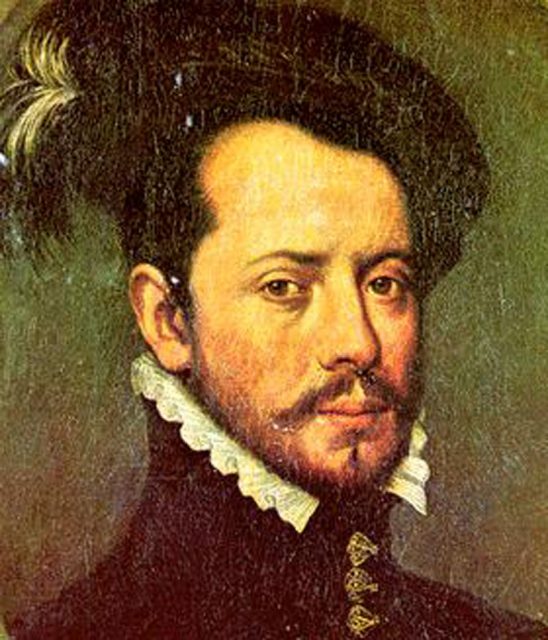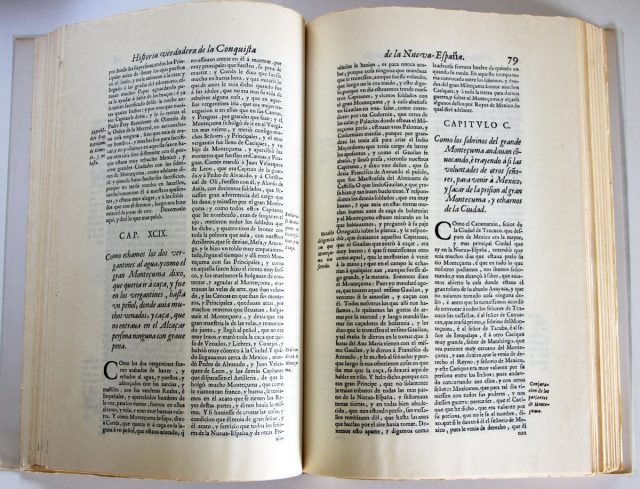Cortés: Latin America’s first novelist?

Carlos Fuentes, one of the great contemporary Latin American writers, once said that La Historia verdadera de la conquista de la Nueva España (‘The truthful history of the conquest of New Spain’, first published in 1632) was the true foundation of the Latin American novel. This chronicle narrates the conquest of modern-day Mexico by the Spanish conquistadors led by Hernán Cortés, as witnessed by one of the soldiers of the party, Bernal Díaz del Castillo. Beyond Fuentes’s claim, this work has long been considered one of the great landmarks of literature in the Spanish language. This being the case, one can only imagine the shockwaves that would run through the realm of Latin American (and, particularly, Mexican) historiography and literary studies if it turned out that the Historia verdadera had not been written by Díaz, as has always been believed, but by none other than the conquistador himself: Hernán Cortés.
This is the main argument of Christian Duverger’s recent book, Crónica de la eternidad (‘The Chronicle of Eternity’, so far only in Spanish edition) 1. Conceived as the second part of his biography of Cortés (published in 2005), and announced as the culmination of ten years of research, Duverger’s Crónica de la eternidad goes against well over four hundred years of historiography by arguing for Cortés’s authorship of the canonical Historia verdadera. In this way Duverger continues with an academic career that has been characterized by attempts to alter some of the most established paradigms of Mesoamerican history. In Cortés he had argued for a new understanding of the conquistador as a man of the Renaissance, much more intelligent and visionary than has so far been accepted; and in El primer mestizaje (2007) he argued for a new periodization of early Mesoamerican history, one that broke free from nineteenth-century schemes. However, due to the importance of the text at hand, Duverger’s most recent proposal might be the most groundbreaking of his career.
Duverger assumes the idea that Bernal Díaz del Castillo could never have written the Historia verdadera. He accepts that the historical character of Bernal Díaz existed, but he believes that the patchwork evidence we have of his life shows that he could not have authored such an erudite and well-written work. The Historia verdadera contains references to Homer, Cicero and other Latin classics, as well as great richness of vocabulary and a clear influence of both Latin constructions and those of the native languages of Mesoamerica. Duverger believes that someone of humble origins like Bernal, who had not undergone any formal education and was probably illiterate could never have produced such a work.

Then there is the issue of the great detail contained in this chronicle. The narrator of Historia verdadera tells of all the major and minor events which transpired during Cortés’s military expedition, including Cortés’s wedding and his interviews with Aztec emperor Moctezuma. He even goes beyond this, narrating Cortés’s meetings with Spanish Emperor Charles V back in Spain once the conquest was finished. In order to believe in Bernál’s authorship we would have to accept him as literally a shadow of Cortés, or at least someone who was so close to him as to be the recipient of his utmost confidence. And yet, as Duverger points out, Bernal is never referred to in the various documents Cortés published in his lifetime (particularly the Cartas de relación) or even in his correspondence. Moreover, Bernal never held any post in Cortés’s army beyond that of a simple soldier.
Discarding the possibility of Bernal’s authorship, Duverger then examines the other members of Cortés’s army who might have authored the Historia verdadera. He finds that only twelve of them could read and write, and one by one he finds reasons to discard them until arriving at Cortés. Duverger finds ample similarities in style between the Historia verdadera and Cortés’s Cartas de relación, which were published by the conquistador during his lifetime. He also points out that, after his fall from grace with Emperor Charles V (who forbade him from publishing again, and had his books burnt in public), Cortés would have been motivated to write his memoirs in ways that would escape government censorship. To this end he would have projected a double memoir: one written using the documents in his archive, which he would have charged to Francisco López de Gómara (Crónica de la conquista de Nueva España, published in 1552) and another written from the perspective of a simple soldier, which he would have penned himself in Spain between 1543 and his death in 1547. This would have been the manuscript of the Historia verdadera. Duverger argues that after Cortés’s death this manuscript found its way to Guatemala and to Bernal, by then an old man of 84. Duverger ventures the possibility that Cortés’s sons would have taken the manuscript with them to America as a way of legitimizing their uprising against the Spanish king. After the failure of this uprising, one of them would have sent the manuscript to Bernal in order to keep it safe. He and his son would then have reworked the manuscript so as to claim authorship of it for Bernal, thus sending historians and literary critics on a false trail for the past four centuries.
Duverger’s claim for Cortés’s authorship of the Historia verdadera fits well with the re-evaluation of the conquistador’s figure which he has proposed throughout his career. In his opinion, Cortés was a man of deep intelligence and learning, a true man of the Renaissance who was able to master both the art of war and that of literature. Duverger has also claimed that Cortés’s project for the lands he conquered was not one of genocide, but of mestizaje, of mixing with the natives (under the control of the crown of Spain, of course) rather than simply wiping them out as had happened in Cuba and other Spanish domains of the Caribbean. Duverger has argued that modern, mixed-race Mexico is indeed the offspring of Cortés’s vision of mestizaje.
Like all ambitious revisionist claims, Duverger’s book will most likely run into much opposition from scholars in the field; not to speak of the feathers this will ruffle amongst those who find the idea of an intellectual and humanized Cortés unpalatable. Indeed, most attempts to challenge the authorship of canonical texts on the basis of lacunae or implausible claims run the risk of posing hypotheses that are equally difficult to believe. Scholars might, for example, find trouble with Duverger’s theory that Cortés’s manuscript travels from Valladolid to Guatemala over the space of twenty years. As happens with the different authorships attributed to Shakespeare’s works, sometimes the end goal of ‘proving’ an alternative authorship blinds the scholar to the logical fallacies of the new hypothesis s/he is positing. However, Duverger’s work will have to be taken seriously by the scholarly community, particularly due to the prestige of its author, the breadth of his research and the clear difficulties in accepting Bernal’s authorship of the Historia verdadera.
References
- Duverger, Christian (2012). Crónica de la eternidad. ¿Quién escribió la Historia verdadera de la conquista de Nueva España? Mexico D.F. : Taurus ↩
2 comments
To portray Bernal Diaz as a straw man for Cortes demands a fabulous sequence of coincidences. On the other hand, it may very well be true that Diaz was comparatively poorly educated. Remember, however, we do have evidence that he could write, for his signature appears upon a nearly 500-year-old Guatemalan government document as a member of a important group of Spanish Guatemalan officials.
For my part, I have always believed that Diaz was interviewed — debriefed if you will — by someone more educated than he, someone who could write and write well, comfortable with editing and arranging text and with the conventions — and pretensions — of the times. If so, it is not impossible to believe that this individual might have have ascribed authorship of the book to the man he interviewed or heard tell it.
Such an event is far easier to believe than a tortuous sequence of events that would have resulted in Diaz’s sons venturing to the then still New World with a finished work for their father’s benefit.
Neither should we forget that a number of conquistadors remained in New Spain after the conquest. Many assumed high positions and gained great wealth. It would be only natural to assume they would have met with one another and relived those great events at every opportunity, so impossible was it even for them to believe they had subjugated nearly a quarter of a continent. So, Diaz’s memory would have not had much opportunity to fade.
Then there is this: as what may have been the oldest and/or sole surviving veteran of the Conquest by the late 1500s, he would have been visited by many who would have wanted to hear the tale of Cortes and his men from the last of them all. After all, the story needed no padding to rank as one of the great adventures of all time, regardless of the teller — bloody as it was, and as calamitous as it was for the Indian civilization then extant.
I like to imagine Diaz’s recounting it in the dim, flickering light of candles and embered hearths before a spell-bound audience, much as would have Homer in ancient, pre-literate Greece. Homer and Diaz, each waxing long and eloquent, fired despite old age by the reliving of their tale, practiced in its telling again and again, and always before a hushed crowd of awed and astounded men, women, and children who would tell it in their turn.
– Melvyn Nunes
I found Duverger’s book fascinating in the extreme and I enjoyed reading your intelligent and well written review.
Being an amateur history reader with a special interest in Cortes and Mexico, I have not found any in-depth analysis and/or critique of Duverger’s main thesis, which, as he himself says, implies that Cortes could well be the ONLY source of contemporary information about the Conquest.
Given the deep implications of this theory for the history of the period, can you tell me if there has been any published response from serious professional historians of the period? .
. Thanks in advance.